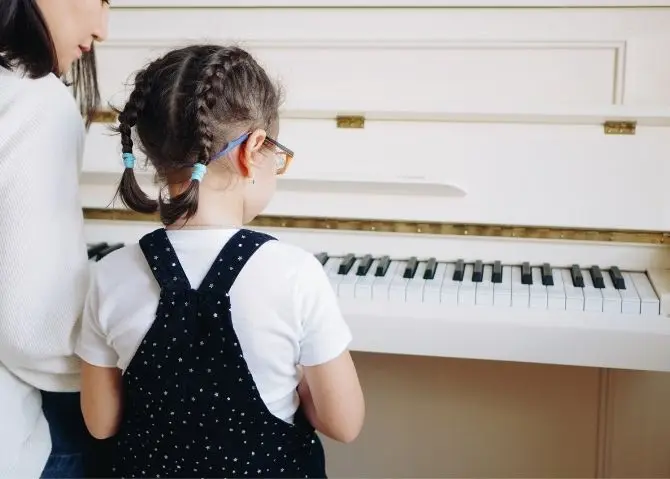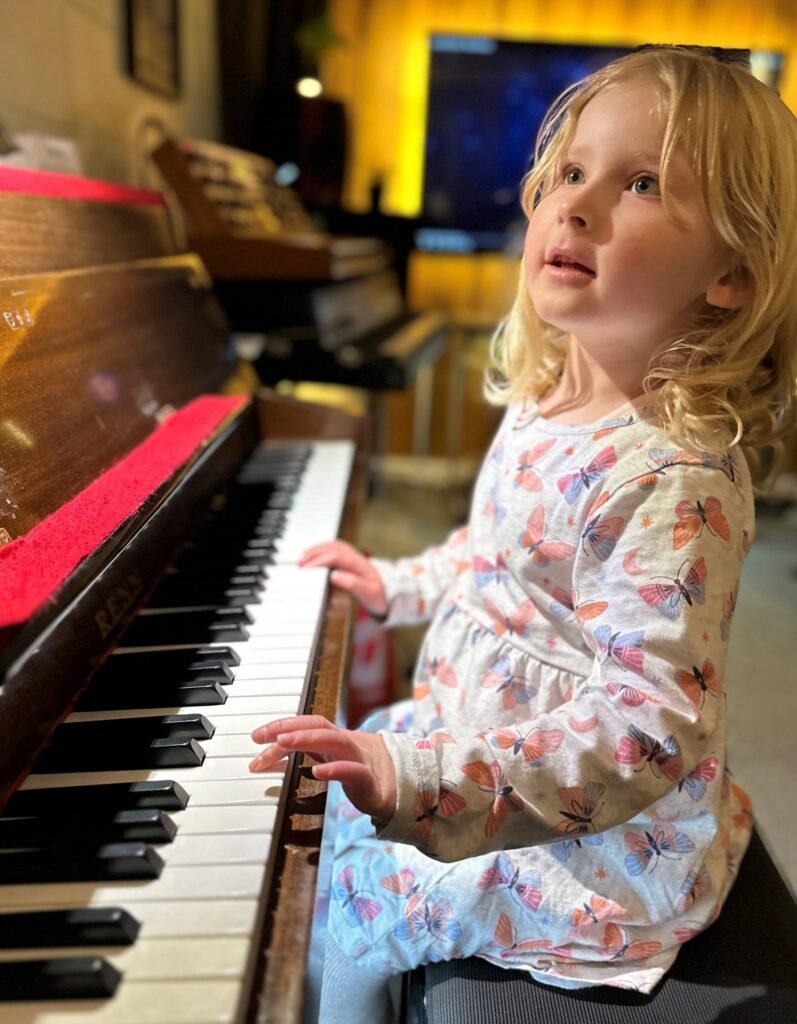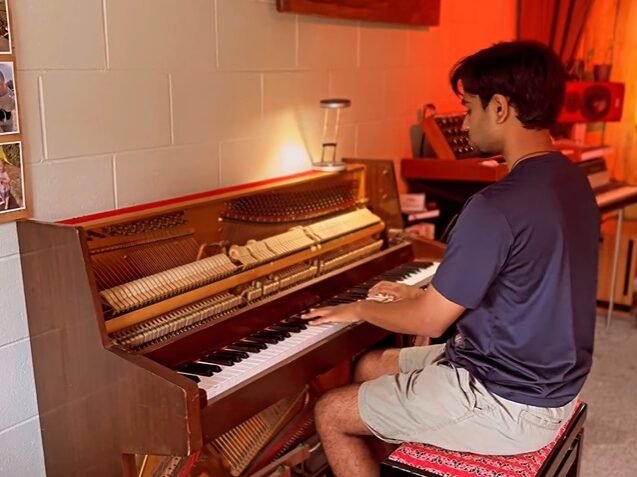Explore the best age to introduce your child to piano lessons and unlock their musical potential with expert guidance from Timothy William, Auckland’s trusted music teacher.
Table of Contents
What is the Optimal Age to Start Piano Lessons?
Determining the right age for piano lessons depends on several factors, including a child’s physical, cognitive, and emotional development. For most children, the ideal age to begin is between 5 and 7 years old. At this stage, they have developed the fine motor skills and hand-eye coordination necessary to play basic melodies and navigate the piano keys.
However, there is no one-size-fits-all answer. Some children show readiness as early as 3 or 4 years old, while others may benefit from waiting until they are slightly older. Below, we’ll explore the key developmental milestones and factors that influence readiness for piano lessons:
1. Fine Motor Skills
Playing the piano requires the ability to press individual keys with precision while maintaining relaxed hands. Children around 5 years old generally have the hand size and dexterity needed to perform basic exercises. Younger children may struggle with these movements, but pre-piano activities like finger games can help them prepare.
2. Cognitive Abilities
Learning piano involves understanding basic concepts such as musical notation, rhythm, and patterns. By age 5 or 6, children can typically grasp these concepts and focus during a 20-30 minute lesson. Preschoolers can also benefit from introductory lessons, but the approach must be playful and focused on building foundational skills.
3. Emotional Readiness
Emotional readiness is just as important as physical and cognitive abilities. Children should have an interest in music and a willingness to practice regularly. Encouragement from parents and a nurturing teaching environment can further enhance their enthusiasm and commitment.
4. Cultural Trends in New Zealand
In Auckland and across New Zealand, there is a growing emphasis on early childhood education in the arts. Music lessons are increasingly popular as parents recognise the value of fostering creativity and discipline from a young age. For children in culturally rich communities, exposure to various musical traditions often sparks an interest in learning the piano.
5. Alternative Starting Ages
While 5-7 years is an ideal range, starting at a later age can also be highly beneficial. Older children and even adults can achieve remarkable progress with the right guidance and motivation. The piano is a versatile instrument that welcomes learners at all stages of life.
Ultimately, the best time to start piano lessons is when your child shows genuine interest and readiness. A conversation with an experienced music teacher, such as Timothy William in Auckland, can help you determine if your child is prepared to begin their musical journey.
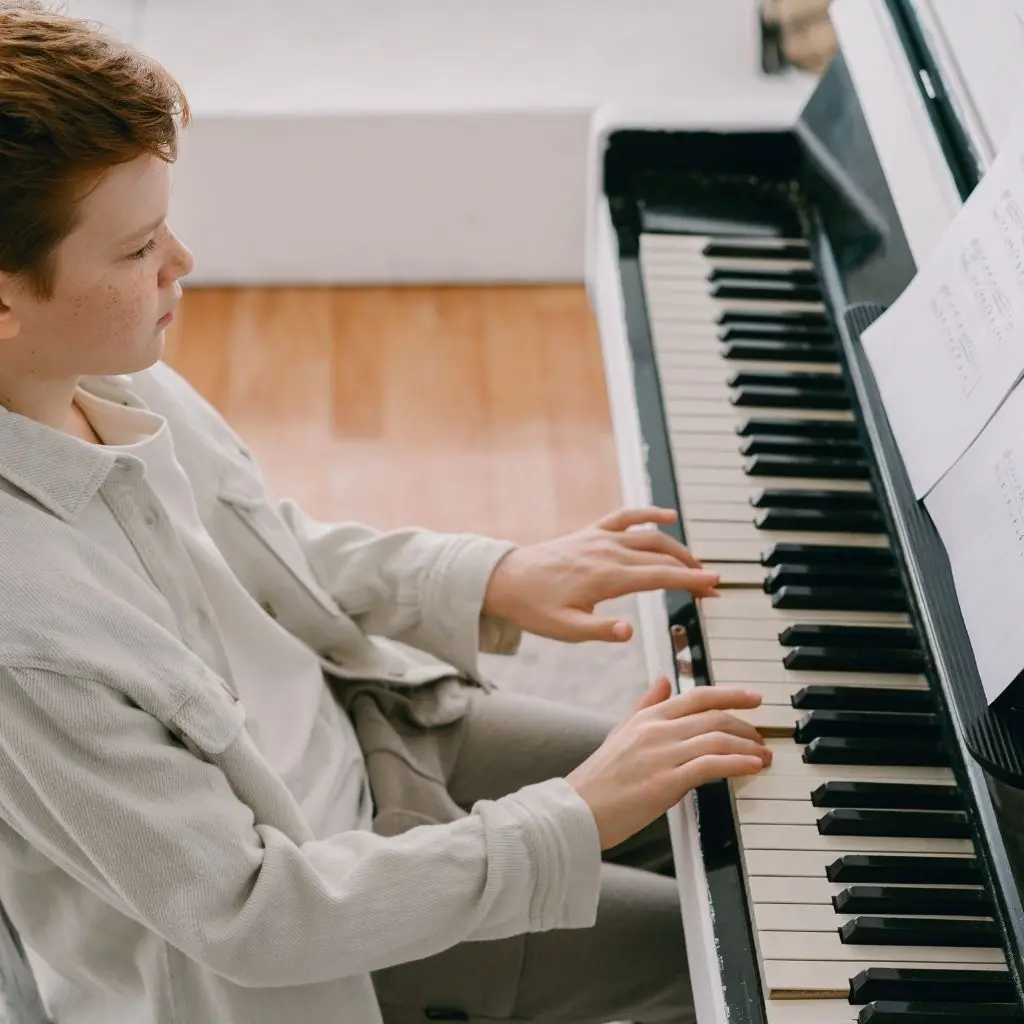
Benefits of Starting Piano Lessons at an Early Age
Starting piano lessons early in a child’s life is an investment in their overall development, offering benefits that reach far beyond music. While the piano is a beautiful instrument that nurtures artistic expression, its role in fostering cognitive, emotional, and social skills cannot be overstated. For parents in Auckland, New Zealand, enrolling children in piano lessons with a qualified teacher provides a pathway to building essential life skills in a structured, creative, and engaging manner.
1. Cognitive Development and Brain Function
One of the most significant advantages of early piano lessons is the impact on brain development. Numerous studies have shown that learning music activates multiple areas of the brain, strengthening neural connections and promoting overall cognitive growth. For young children, this translates into improved memory, enhanced problem-solving abilities, and better attention spans.
Piano lessons also help develop spatial-temporal reasoning, a skill closely linked to mathematics and logical thinking. By reading sheet music and translating it into hand movements, children learn to interpret patterns, think critically, and make decisions in real time. These skills benefit academic pursuits and contribute to a child’s intellectual foundation.
2. Emotional Development and Self-Expression
Emotional growth is another key benefit of early piano lessons. Music is a universal language of emotion, and playing the piano provides children with a healthy outlet for expressing their feelings. This can be particularly helpful during their formative years, as they learn to navigate the complexities of emotional regulation and self-awareness.
Piano lessons also teach children the value of patience and perseverance. Learning to master a challenging piece requires consistent effort and determination, fostering resilience and a sense of achievement. This ability to overcome obstacles through practice builds self-confidence and equips children with valuable coping strategies they can use throughout life.
3. Development of Fine Motor Skills
Physical coordination is another area where early piano education can make a difference. Playing the piano requires precise hand movements, finger dexterity, and coordination between both hands and the eyes. For young children, this repetitive practice enhances fine motor skills and builds muscle memory. Over time, these skills become second nature and can positively impact other activities requiring precision and control, such as writing or sports.
4. Social Skills and Communication
Although piano playing is often an individual activity, the learning process is highly interactive. Children work closely with their teacher, receiving guidance, feedback, and encouragement. In group settings, such as recitals or ensemble practices, young pianists learn to collaborate with others, listen actively, and adapt to a shared goal.
These experiences help children develop essential social skills, such as effective communication, empathy, and the ability to handle constructive criticism. In Auckland, where music often plays a central role in community events, these skills can further integrate children into cultural and artistic communities, fostering a sense of belonging.
5. Academic Benefits
The connection between music education and academic success is well-documented. Children who study piano tend to perform better in subjects like mathematics, reading, and language arts. The discipline and focus required for regular practice translate seamlessly into classroom settings, where these skills enhance productivity and learning outcomes.
Additionally, music lessons promote time management and goal setting. By learning to break down complex pieces into manageable sections and setting milestones for improvement, children develop organisational skills that are invaluable in academic and professional environments.
6. Cultural and Artistic Appreciation
Early piano lessons expose children to a rich tapestry of musical traditions, helping them develop an appreciation for different cultures and artistic expressions. By learning classical compositions alongside contemporary pieces, children gain insights into history, global diversity, and the evolution of music.
In Auckland’s vibrant cultural landscape, piano education can connect children to local music festivals, performances, and artistic initiatives. This exposure nurtures their creativity and instills a lifelong love for the arts, enriching their cultural identity.
7. Long-Term Life Skills
Beyond childhood, the skills cultivated through early piano lessons remain relevant throughout life. Discipline, perseverance, and creative thinking are foundational traits that contribute to success in various domains. Whether children pursue music as a career or simply as a hobby, the lessons learned from the piano become lifelong assets.
For many, the ability to play the piano becomes a source of personal enjoyment, stress relief, and emotional connection. Adults who began piano lessons in childhood often speak of the joy and fulfillment they derive from their musical journey, which began with the simple act of pressing keys for the first time.
Parents in Auckland looking to provide their children with a comprehensive educational experience will find piano lessons to be a valuable choice. The early start not only builds technical proficiency but also supports their child’s holistic development, making it an investment with benefits that last a lifetime.
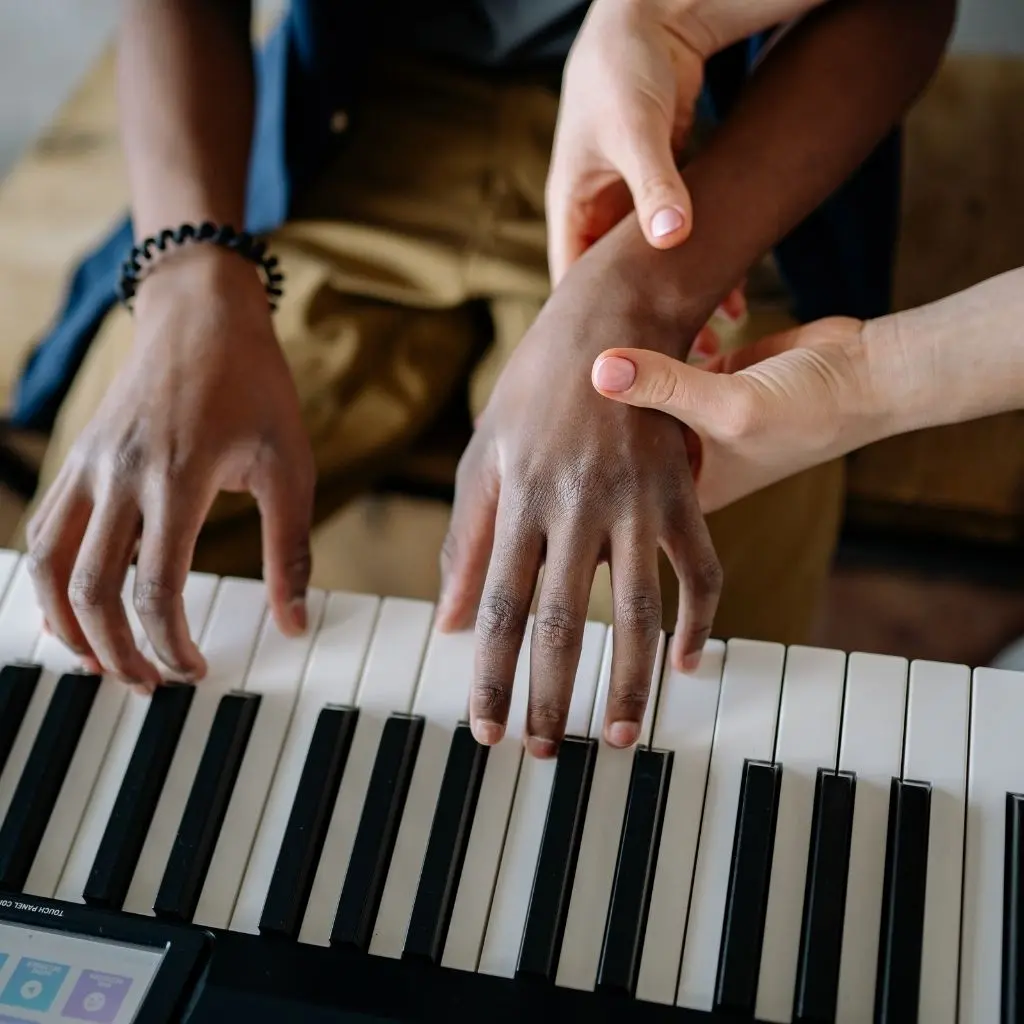
Signs Your Child is Ready to Start Piano Lessons
Deciding when to start piano lessons is a significant step for parents, and recognising the signs of readiness can help ensure a positive and rewarding experience. While age is a helpful guideline, every child develops at their own pace. It’s essential to assess their physical, cognitive, and emotional preparedness before committing to lessons. For families in Auckland, this decision can also include exploring local music education resources and trial lessons to gauge interest.
1. Interest in Music
One of the clearest indicators that your child is ready for piano lessons is a genuine interest in music. Do they enjoy listening to songs, tapping out rhythms, or experimenting with a keyboard? These behaviours suggest an innate curiosity about music that can be nurtured through formal lessons. Encouraging this interest early can foster a lifelong appreciation for music and creativity.
In Auckland, many families expose their children to local music events or home instruments, sparking enthusiasm for musical education. If your child regularly shows excitement when interacting with music, it might be time to consider lessons.
2. Physical Readiness
Playing the piano requires certain physical abilities, such as hand strength, finger dexterity, and coordination. Children around 5 to 7 years old typically develop these skills, making it easier for them to press keys accurately and use both hands independently. If your child can comfortably use their hands for tasks like drawing or picking up small objects, they are likely physically prepared for beginner piano exercises.
Additionally, sitting still for short periods is essential during lessons. If your child can maintain focus while seated, they are better equipped to follow a teacher’s instructions and engage with the piano.
3. Ability to Follow Instructions
Piano lessons require children to listen carefully and follow step-by-step instructions. A child who can follow directions during other activities—such as building with blocks or completing a puzzle—will likely adapt well to the structure of music lessons. This ability is especially important for developing good practice habits and making consistent progress.
If your child demonstrates patience and a willingness to learn, these traits will serve them well in the learning process. In Auckland, music educators like Timothy William often assess these skills during initial sessions to tailor lessons to each student’s needs.
4. Emotional Maturity
Emotional readiness is just as important as physical and cognitive preparedness. A child should be able to handle constructive feedback and feel comfortable with the learning process, which involves trial and error. An emotionally mature child is more likely to remain motivated and enjoy the journey of learning an instrument, even when faced with challenges.
Parents can assess this by observing their child’s reactions to new activities. If your child can handle minor frustrations and keep trying, they are well-positioned for the persistence required in piano education.
5. Desire for Routine
Piano lessons thrive on consistency, and a child who responds well to routine will benefit from regular practice sessions. If your child enjoys scheduled activities and adapts well to structured environments, they may be ready to incorporate piano lessons into their weekly routine.
It’s also helpful to start with short lessons or practice sessions to build stamina. For young beginners in Auckland, many teachers recommend 15- to 30-minute sessions to accommodate their attention spans.
6. Parental Support
A crucial factor in a child’s readiness for piano lessons is the level of support they receive at home. Parents play an active role in encouraging practice, providing a distraction-free environment, and fostering a positive attitude toward learning. If you’re ready to invest time and effort into your child’s musical education, they are more likely to succeed.
In Auckland, parents often find that attending music recitals or exploring local music programs together strengthens their child’s motivation and commitment to piano lessons.
7. Trial Lessons and Teacher Feedback
If you’re still unsure about your child’s readiness, consider scheduling a trial lesson with a professional music teacher. Instructors like Timothy William in Auckland are skilled at assessing a child’s strengths and areas for development. These initial sessions provide valuable insights into whether your child is prepared to start formal lessons or would benefit from waiting a little longer.
During the trial lesson, observe how your child interacts with the piano and the teacher. Do they enjoy the experience? Are they eager to learn? A positive response is a good indication that they are ready to begin their musical journey.
Recognising the signs of readiness is an essential step in starting piano lessons. By carefully considering your child’s physical, cognitive, and emotional development, you can make an informed decision that sets them up for success. In Auckland, a wealth of resources and expert instructors are available to help guide your child through this exciting chapter of their life.
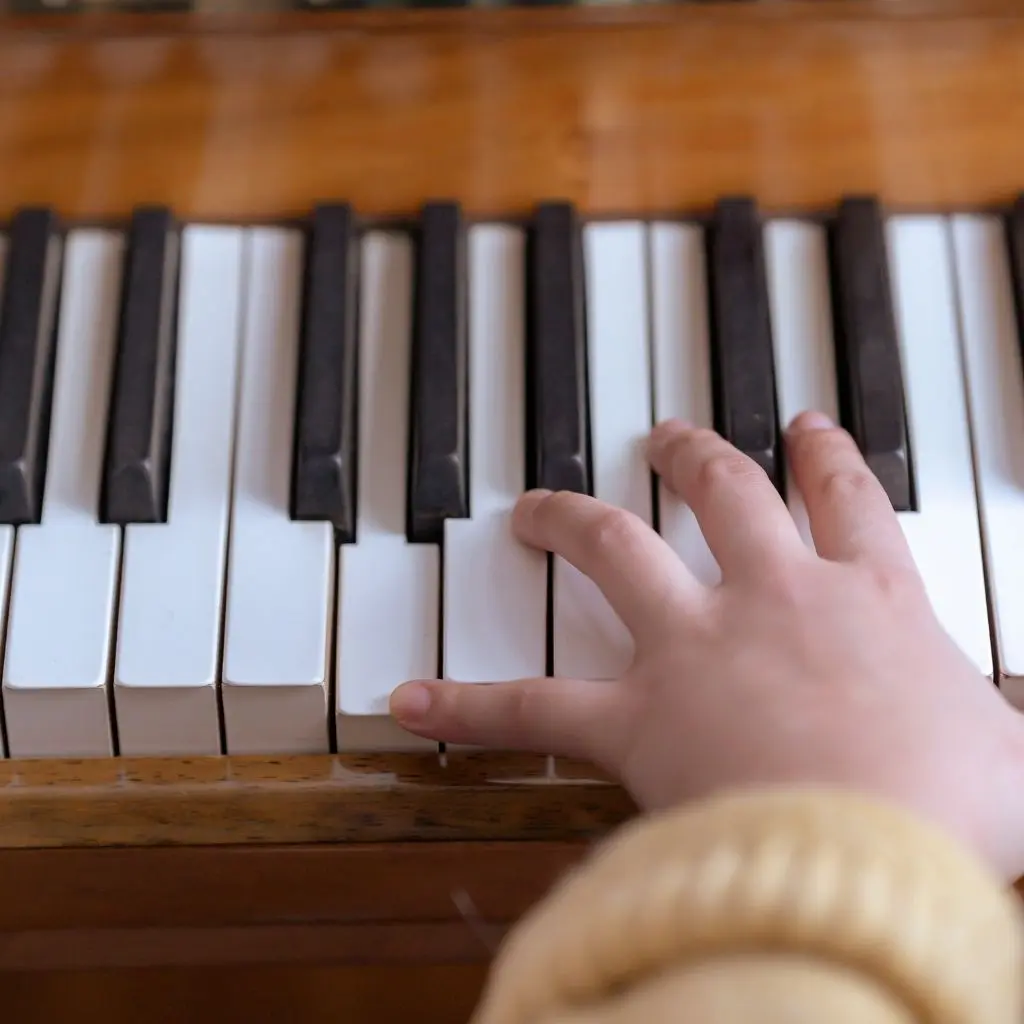
How to Support Your Child’s Piano Journey
Supporting your child’s piano journey is a rewarding experience that can strengthen your bond while helping them develop discipline and a love for music. However, children often need encouragement and guidance to stay motivated and engaged in their musical education. As a parent, your role is crucial in creating an environment where learning the piano becomes a fun and fulfilling activity rather than a chore.
Here are practical ways to support your child as they embark on their piano journey, tailored for families in Auckland with access to excellent music education resources.
1. Create a Dedicated Practice Space
A comfortable, well-equipped practice area is essential for fostering focus and creativity. Set up a space in your home with minimal distractions, adequate lighting, and a suitable piano or keyboard. Ensure the instrument is at the correct height for your child, with an adjustable bench to promote good posture and technique.
In Auckland, local piano shops and online retailers offer a range of high-quality keyboards and pianos suitable for beginners. If you’re unsure which instrument to choose, consult your child’s piano teacher for recommendations.
2. Establish a Consistent Practice Routine
Consistency is key to developing musical skills. Work with your child to establish a regular practice schedule that fits into their daily routine. Start with short sessions, such as 15-20 minutes for younger beginners, gradually increasing the duration as they grow more comfortable with the piano.
Encourage your child to treat practice time as a non-negotiable part of their day, just like homework or mealtime. However, be flexible when necessary—balance is important to avoid burnout.
3. Celebrate Progress and Achievements
Positive reinforcement can significantly boost your child’s confidence and enthusiasm for piano lessons. Celebrate their milestones, whether it’s mastering a new piece, improving their technique, or completing a recital. Small rewards, like stickers, praise, or a favourite treat, can motivate them to keep progressing.
Attending their recitals or sharing their performances with family and friends demonstrates your pride in their accomplishments, fostering a sense of achievement and encouragement.
4. Stay Involved Without Pressure
While it’s important to stay involved in your child’s piano journey, avoid placing undue pressure on them to perform perfectly or advance rapidly. Learning music is a process that requires patience and practice. Focus on their progress rather than perfection, and remind them that mistakes are a natural part of learning.
Regularly check in with your child and their teacher to understand their strengths, challenges, and preferences. Open communication helps you stay engaged without overstepping boundaries or creating stress.
5. Provide Access to Inspiring Resources
Inspire your child by exposing them to a variety of musical experiences. Attend live performances in Auckland, such as those hosted by the Auckland Philharmonia Orchestra or local music schools. Watching skilled pianists perform can ignite your child’s passion and motivate them to practice more.
Additionally, online resources like instructional videos, music apps, and digital sheet music can supplement their lessons and make practice sessions more interactive and enjoyable.
6. Encourage Creative Exploration
While structured lessons are vital, giving your child the freedom to explore the piano independently can spark creativity and deepen their connection to music. Encourage them to improvise, compose simple melodies, or play their favourite songs by ear.
A balanced approach that combines structured practice with creative exploration can make the learning process more enjoyable and engaging.
7. Communicate with the Teacher
Regular communication with your child’s piano teacher is essential for their progress. Share updates on your child’s practice habits, ask for feedback, and discuss any challenges they may face. Teachers like Timothy William in Auckland are skilled at adapting lessons to meet each child’s unique needs and can offer valuable advice for supporting their growth.
By staying in touch with the teacher, you can ensure your child receives the guidance and encouragement they need to thrive.
8. Be a Role Model
Children often mirror their parents’ attitudes and behaviours. Show enthusiasm for music by listening to a variety of genres, attending concerts, or even learning an instrument yourself. Your positive attitude towards music can inspire your child to stay committed to their piano journey.
If you have prior musical experience, consider playing duets with your child or discussing your own learning experiences. This shared interest can strengthen your relationship and make the piano journey a family affair.
Supporting your child’s piano journey is about creating an environment that nurtures their love for music while building discipline, confidence, and creativity. By providing encouragement, resources, and a positive attitude, you’ll help your child enjoy the lifelong benefits of piano education. Parents in Auckland have access to excellent music teachers, like Timothy William, and vibrant cultural events that can further enrich their child’s learning experience.
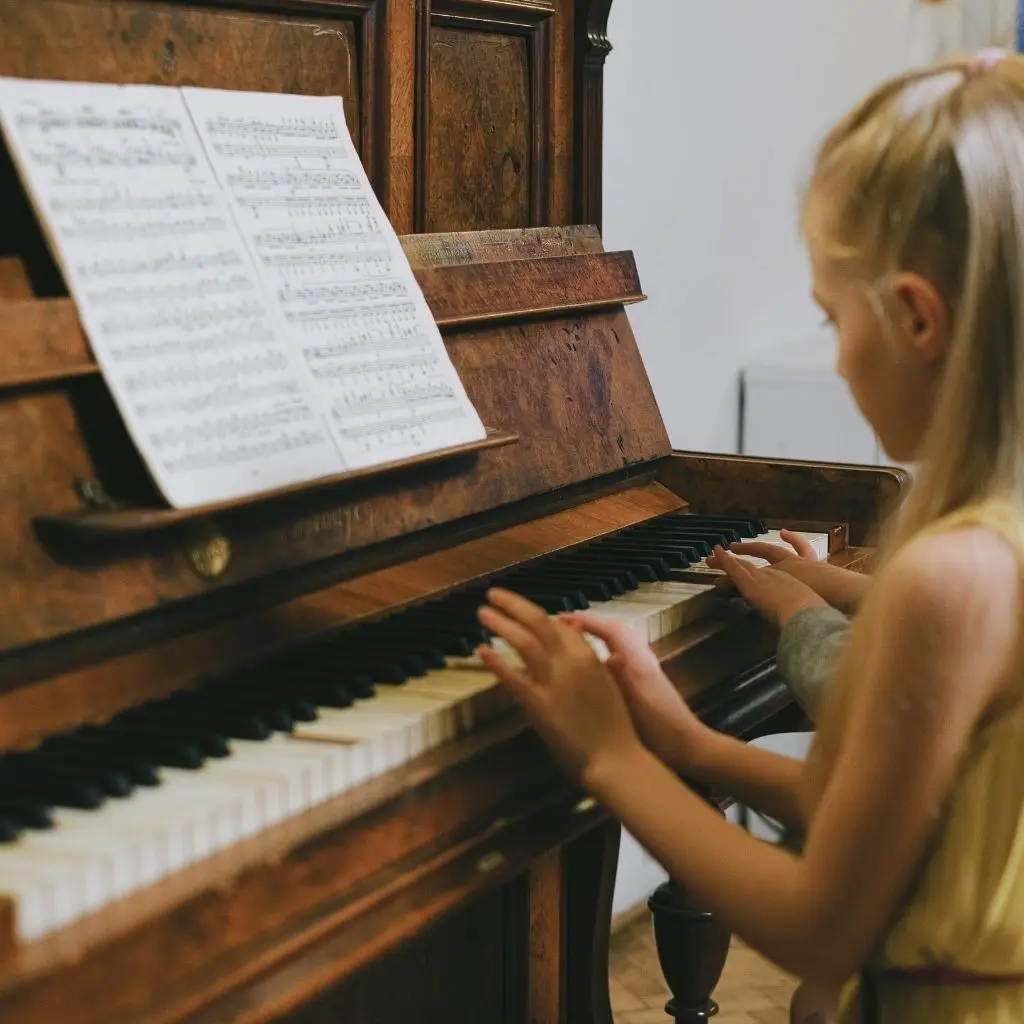
Why Choose Timothy William for Piano Lessons in Auckland
Selecting the right piano teacher is one of the most critical decisions when starting your child’s musical journey. Timothy William, a professional music teacher based in Auckland, New Zealand, offers a unique blend of expertise, passion, and personalised teaching methods that make him an excellent choice for piano lessons. Whether your child is a beginner or an intermediate learner, Timothy’s approach ensures they receive the support and encouragement needed to succeed.
1. Expertise in Music Education
With years of experience in teaching piano and other musical disciplines, Timothy William has honed his ability to adapt lessons to suit each student’s individual needs. His in-depth knowledge of music theory and practical techniques enables students to build a strong foundation while exploring their unique musical interests.
Timothy’s teaching style blends traditional methods with modern practices, ensuring that students remain engaged and excited about their lessons. From classical compositions to contemporary pieces, his versatile approach caters to diverse musical preferences.
2. Personalised Teaching Approach
One of Timothy’s strengths lies in his ability to tailor lessons to the specific goals and learning styles of his students. He understands that every child learns differently and adjusts his teaching methods accordingly. For young beginners, Timothy uses interactive and fun activities to keep them engaged, while older students benefit from more structured and challenging lesson plans.
This personalised approach fosters a positive learning environment where students feel encouraged to take risks, ask questions, and grow at their own pace.
3. Focus on Building Confidence and Creativity
Timothy believes that music is more than just an art form—it’s a tool for personal growth. His lessons are designed to instil confidence, discipline, and creativity in his students. By emphasising progress over perfection, Timothy helps students develop a sense of achievement and pride in their musical journey.
Additionally, Timothy encourages students to explore their creative side by experimenting with improvisation and composition. These activities not only make lessons more enjoyable but also deepen students’ understanding of music as a language of expression.
4. Access to Performance Opportunities
Performance is an integral part of learning the piano, and Timothy ensures his students have opportunities to showcase their skills. From informal recitals to more structured performances, these experiences help students build confidence and celebrate their progress.
In Auckland’s vibrant music scene, Timothy connects his students to local events and activities, providing them with a platform to grow as performers and connect with the wider musical community.
5. Welcoming Students of All Ages
Timothy’s teaching isn’t limited to children—he welcomes students of all ages, including teenagers and adults who wish to begin or revisit their piano education. His adaptable teaching style makes him a great fit for learners at any stage of life.
Whether you’re a parent looking for lessons for your child or an adult seeking a new hobby, Timothy’s expertise and approachable demeanour ensure a positive and enriching experience.
6. Convenient Location and Scheduling
Located in Auckland, Timothy offers lessons that fit seamlessly into the busy lives of families and individuals. Flexible scheduling options make it easier to balance piano lessons with other commitments, ensuring students can prioritise their musical education without added stress.
Timothy’s studio provides a welcoming and professional environment where students can focus and thrive. Alternatively, virtual lessons are available for those who prefer the convenience of learning from home.
Contact Timothy William
If you’re ready to begin your child’s piano journey or explore music lessons for yourself, Timothy William is here to guide you every step of the way. With his personalised teaching approach and commitment to excellence, Timothy makes learning the piano a rewarding and enjoyable experience.
Get in touch today to schedule your first lesson or learn more about his services:
- Phone: +6421539273
- Email: tim@timothywilliam.co.nz
Frequently Asked Questions About Starting Piano Lessons
Below are answers to some of the most common questions parents and aspiring pianists in Auckland have about starting piano lessons. Whether you’re considering lessons for your child or yourself, these insights can help you make an informed decision.
1. What is the best age to start piano lessons?
While most children are ready to start piano lessons between the ages of 5 and 7, readiness varies based on physical, cognitive, and emotional development. Some children may start as early as 3 or 4 if they show interest and have the fine motor skills to play. Older children and adults can also successfully learn the piano with the right guidance.
2. How do I know if my child is ready for piano lessons?
Signs that your child is ready for piano lessons include an interest in music, the ability to follow instructions, physical readiness (e.g., hand strength and coordination), and emotional maturity to handle constructive feedback. A trial lesson with a qualified teacher, such as Timothy William, can help assess readiness.
3. What kind of piano or keyboard should we buy for a beginner?
Beginners can start with a digital keyboard or an acoustic piano, depending on your budget and space. Look for a keyboard with at least 61 weighted keys to mimic the feel of a real piano. For families in Auckland, local music stores often provide rental options or affordable beginner pianos to suit your needs.
4. How often should my child practice the piano?
Regular practice is key to progress. For young beginners, 15-20 minutes a day is a good starting point, increasing gradually as they develop. Consistency is more important than the length of each session, so aim for daily practice to build a habit.
5. Can adults learn the piano, or is it too late to start?
It’s never too late to start learning the piano! Adults often bring a greater focus and discipline to lessons, which can lead to rapid progress. Timothy William offers tailored lessons for adult learners, helping them achieve their musical goals at any stage of life.
6. How long does it take to learn the piano?
The time it takes to learn the piano depends on individual goals and the amount of practice. Beginners typically learn basic songs within a few months, while more advanced skills can take years to master. Consistent practice and quality instruction are key to steady progress.
7. Do we need a teacher, or can we learn piano online?
While online resources can supplement learning, having a qualified teacher like Timothy William ensures personalised guidance, proper technique, and accountability. A teacher can tailor lessons to your needs, making the learning process more effective and enjoyable.
8. Are there performance opportunities for students in Auckland?
Yes, performance opportunities are an integral part of learning the piano. Teachers like Timothy William organise recitals and encourage students to participate in local music events, helping them build confidence and connect with the community.
Have more questions? Reach out to Timothy William for personalised advice and expert guidance on starting your or your child’s piano journey in Auckland.

